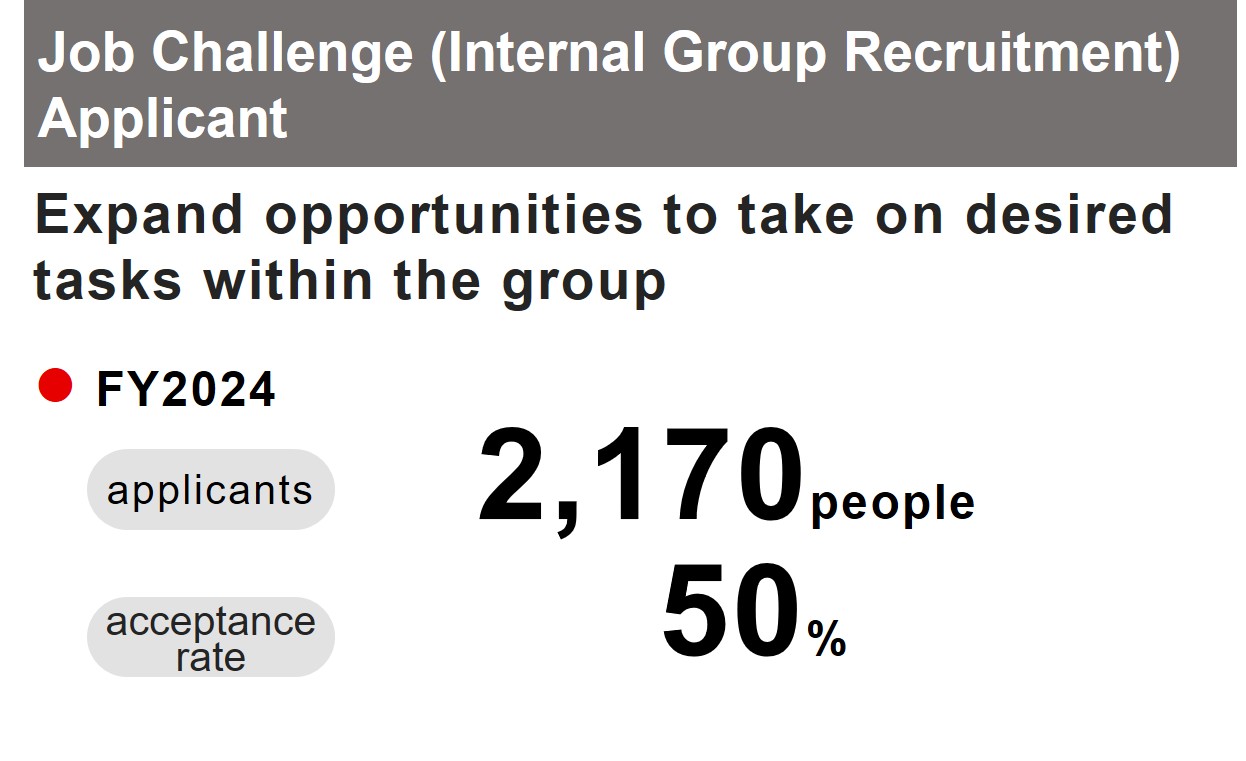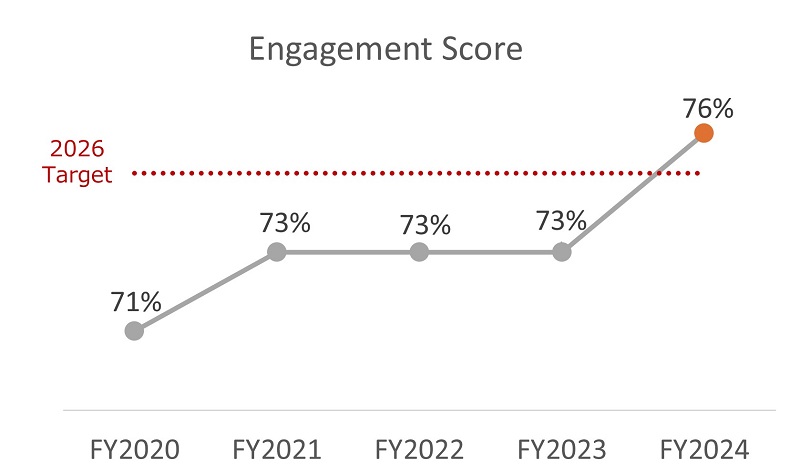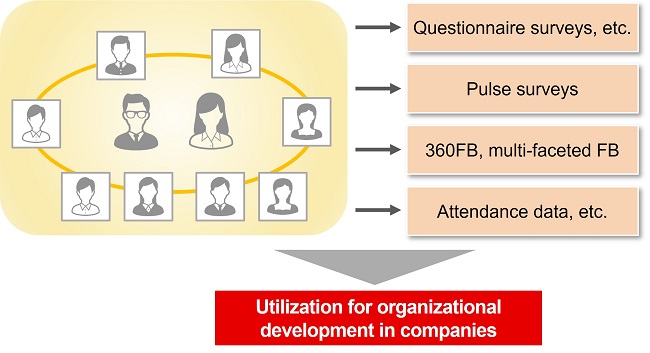Systems that Encourage Challenges
Autonomous Career Development
As a system to support autonomous career development for each employee, we have positioned the Career Challenge System as a framework that enables employees to proactively choose their career paths, and offers a variety of programs.
For example, MUFG has a cross-group open recruitment system called the "Job Challenge" program. In fiscal year 2024, approximately 2,200 employees applied, and around 1,200 of them successfully transferred to their desired departments or began internal side jobs outside their current departments, mainly at headquarters.

Career Challenge System
Program |
Description |
Participants | ||
|---|---|---|---|---|
| FY2023 | FY2024 | |||
| Job Challenge(note1) (excluding Mirushiru) |
An internal recruitment system within the group. Utilizing MUFG's vast field, it provides opportunities for employees to proactively challenge themselves in their desired roles, regardless of the company they belong to. | 2,869 applicants, 48% acceptance rate |
2,170 applicants, 50% acceptance rate |
|
| Internal Side Jobs (note2) | A system for side jobs within the Bank and internally. It supports autonomous and multi-track career development while promoting internal innovation. | 428 applicants | 935 applicants | |
| Mirushiru(note3) | A job experience-based recruitment system that allows employees to understand the specific content of a job in about half a day. | 338 applicants | 592 applicants | |
Position Maker(note4) |
A recruitment system where employees can freely propose their ideas and projects and become the "project leader" themselves. | 37 applicants | 17 applicants | |
External Assignments and Dispatch(note1) (including Open EX) |
Provides opportunities for employees to challenge themselves in roles outside the group, gaining diverse knowledge and experience. | 83 applicants | 26 applicants | |
| Challenge Leave(note3) | Supports activities that contribute to personal growth (such as starting a business, studying abroad, obtaining qualifications, or engaging in public activities) by allowing a certain period of leave. | 18 applicants |
22 applicants | |
| Global mobility programs for locally-hired Employees(note4) | A job posting system for vacant positions within the company, a three-month OJT program at the headquarters, and short- and long-term assignment, etc. | 93 users |
87 users | |
- The Bank, the Trust Bank and MUMSS
- The Bank
- The Bank and the Trust Bank
- The Bank and MUMSS
■ MUFG Bank
“Job Challenge” provides opportunities to apply for various positions across domestic and overseas branches as well as headquarters, attracting numerous applications from employees.
In addition, we have introduced systems such as the “Remote Transfer System” to accommodate circumstances like a spouse's job transfer or family caregiving, and the "Employee Appointment System" for contract employees, among others. These initiatives pursue corporate social responsibility (CSR) from the perspective of respecting work-life balance. For overseas employees, we have also established a Global Job Posting Framework, which increases opportunities for assignments not only in their hiring location but also in other locations, including Japan.
■ Mitsubishi UFJ Trust and Banking
■ Mitsubishi UFJ Morgan Stanley Securities
To promote understanding of internal divisions, we hold briefing sessions where employees introduce their departments, and we actively promote programs such as “Mirushiru,” which enables employees to learn about the specific content of a job in approximately half a day.
We have also expanded opportunities for self-development, including support for self-study and professional qualification acquisition. In addition, we have established systems such as the “Remote Transfer Request System,” which allows employees with location restrictions to apply for transfers involving relocation due to marriage or a spouse’s job transfer, and the “Course Change System,” which enables employees to apply for a change to a different career track based on their abilities, aptitudes, or changes in values. These initiatives collectively support diverse career development.
■ Mitsubishi UFJ NICOS
To respond to the autonomous career development aspirations of motivated and capable employees, we conduct the "Challenge Recruitment" twice a year, which allows employees to challenge their desired departments, roles, and even managerial positions. Additionally, the "Course Change System" supports career development that aligns with diverse values and work styles by allowing transfers not only to area-specific and nationwide general positions but also to region-specific general positions.
We are committed to operating systems that promote the appointment of employees who challenge themselves to realize their careers while balancing work and life.
■ ACOM
■ Mitsubishi UFJ Asset Management
As part of our support for autonomous career development, we have established a "Self-Declaration" system and an "Open Recruitment System." In the "Self-Declaration" system, each employee can declare their thoughts on their career. The "Open Recruitment System" allows employees to apply for their desired positions. This system is not only applicable to internal transfers but also to external positions and attending graduate school for working professionals. We are focusing on initiatives that respond to employees' aspirations for career advancement.
We provide a "Career Path BOOK" as a resource to help employees think about their careers. By introducing employees who have utilized various systems, training, and self-development programs to enhance their skills and succeed, we aim to visualize career paths.
Career Development Focused on Specialization
Creating a Workplace Where Employees Feel Career Fulfillment
Along with providing compensation that reflects each employee's contributions, we conduct the "MUFG Group Employee Survey" annually to identify issues faced by our employees. The results are used to improve the workplace environment and organizational structure.
We disclose the Engagement Score as one of our human capital KPIs, and by quantitatively measuring progress, we aim to enhance various initiatives.
The engagement scores for the past five years were 71% in FY2020, 73% in FY2021, 73% in FY2022, 73% in FY2023, and 76% in FY2024.

Employee Benefits/Financial Wellness
FY2025 Actual Wage Increases(note1)
| Bank | Trust Bank | MUMSS |
|---|---|---|
| Approx. 9% of annual income | Approx. 7.5% of annual income | Approx. 8% of monthly income(note2) |
- Includes base-ups, regular raises, promotions, other allowances and subsidies, and bonuses (the Bank and the Trust Bank)
- Monthly income base raises since MUMSS bonuses are tied to performance
Key Employee Benefit Programs
| Housing and Relocation | Company housing and dormitories/Rent subsidies/Allowance for single assignments/Remote transfer allowance/relocation allowance/one-time relocation payment/Relocation travel expenses |
|---|---|
| Asset Building, Pension, and Retirement | Employee stock ownership plan/Property accumulation savings plan/Defined Benefit Corporate Pension(DB)/Defined Contribution Pension(DC)/Stock-based compensation plan/Retirement allowance system |
Health and Medical Support |
Supplemental high-cost medical expense coverage (beyond statutory benefits)/Subsidies for health checkups beyond statutory requirements |
| Preparedness | Group life insurance/Group casualty insurance/Special condolence payments |
| Others | Comprehensive welfare service menu/Child allowance/Subsidies for self-development expenses/Commuting expenses/Business travel expenses/In-house cafeteria |
- These programs apply to employees of the Bank, Trust Bank, and Securities companies. Depending on the business category, certain programs may also apply to contract or temporary employees.
Initiatives for Work-Life Balance
At MUFG, we aim to create an environment and work style where each individual can work healthily and vibrantly. To achieve this, we have established various systems related to work location, working hours, leave policies, and career challenge opportunities, all aimed at improving employees' work-life balance.
Examples include: remote work, use of satellite offices, discretionary labor system, flexible working hours, hourly paid leave, and internal/external side job opportunities.

Organizational Development through Data Utilization
At the Bank, the Trust Bank, and MUMSS, we regularly conduct pulse surveys (daily to twice a year) to monitor employees' motivation, health status, and workplace environment. Based on the results, we perform organizational diagnostics. By sharing these results with employees, we facilitate the early detection and resolution of issues, promoting the creation of a healthy and dynamic workplace.
In May 2023, the Bank released a tool called the "Organizational Diagnostic System" for management, which allows for unified monitoring of work conditions and engagement levels across different organizations. This tool is used in discussions at HR management meetings and other forums within the branches to ensure that each employee can work energetically in a healthy and sound workplace environment. We also provide various support data to help understand the actual conditions at each branch and to optimize labor management. Additionally, we plan to expand the provision of data to support the promotion of department-specific engagement enhancement initiatives.


